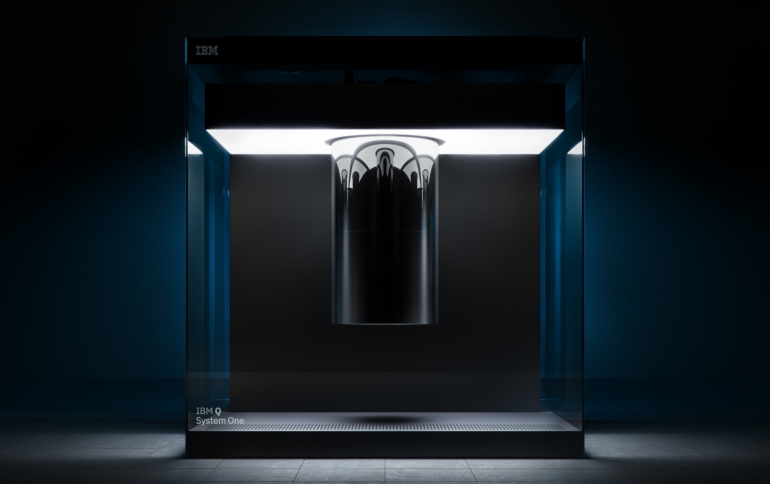
IBM Unveils World's First Integrated Quantum Computing System for Commercial Use
At the 2019 Consumer Electronics Show (CES), IBM unveiled IBM Q System One, the world's first integrated universal approximate quantum computing system designed for scientific and commercial use.
IBM also announced plans to open its first IBM Q Quantum Computation Center for commercial clients in Poughkeepsie, New York in 2019.
IBM Q System One enables universal approximate superconducting quantum computers to operate outside the research lab for the first time. It's a major step forward in the commercialization of quantum computing, which could one day enable breakthroughs in such areas as materials and drug discovery, financial services, and artificial intelligence.
Designed by IBM scientists, systems engineers and industrial designers, IBM Q System One has a modular and compact design optimized for stability, reliability and continuous commercial use. For the first time ever, IBM Q System One enables universal approximate superconducting quantum computers to operate beyond the confines of the research lab.
Much as classical computers combine multiple components into an integrated architecture optimized to work together, IBM is applying the same approach to quantum computing with the first integrated universal quantum computing system. IBM Q System One is comprised of a number of custom components that work together to serve as the most advanced cloud-based quantum computing program available, including:
- Quantum hardware designed to be stable and auto-calibrated to give repeatable and predictable high-quality qubits;
- Cryogenic engineering that delivers a continuous cold and isolated quantum environment;
- High precision electronics in compact form factors to tightly control large numbers of qubits;
- Quantum firmware to manage the system health and enable system upgrades without downtime for users; and
- Classical computation to provide secure cloud access and hybrid execution of quantum algorithms.
The IBM Q Quantum Computation Center opening later this year in Poughkeepsie, New York, will expand the IBM Q Network commercial quantum computing program, which already includes systems at the Thomas J. Watson Research Center in Yorktown, New York. This new center will house some of the world's most advanced cloud-based quantum computing systems, which will be accessible to members of the IBM Q Network, a worldwide community of Fortune 500 companies, startups, academic institutions, and national research labs working with IBM to advance quantum computing and explore practical applications for business and science.
IBM assembled a team of industrial designers, architects, and manufacturers to work alongside IBM Research scientists and systems engineers to design IBM Q System One, including UK industrial and interior design studios Map Project Office and Universal Design Studio, and Goppion, a Milan-based manufacturer of high-end museum display cases that protect some of the world's most precious art including the Mona Lisa at the Louvre, and the Crown Jewels at the Tower of London.
Together these collaborators designed the first quantum system to consolidate thousands of components into a glass-enclosed, air-tight environment built specifically for business use, a milestone in the evolution of commercial quantum computers.
This integrated system aims to address one of the most challenging aspects of quantum computing: continuously maintaining the quality of qubits used to perform quantum computations. Powerful yet delicate, qubits quickly lose their special quantum properties, typically within 100 microseconds (for state-of-the-art superconducting qubits), due in part to the interconnected machinery's ambient noise of vibrations, temperature fluctuations, and electromagnetic waves. Protection from this interference is one of many reasons why quantum computers and their components require careful engineering and isolation.
The design of IBM Q System One includes a nine-foot-tall, nine-foot-wide case of half-inch thick borosilicate glass forming a sealed, airtight enclosure that opens effortlessly using "roto-translation," a motor-driven rotation around two displaced axes engineered to simplify the system's maintenance and upgrade process while minimizing downtime – another innovative trait that makes the IBM Q System One suited to reliable commercial use.
A series of independent aluminum and steel frames unify, but also decouple the system's cryostat, control electronics, and exterior casing, helping to avoid potential vibration interference that leads to "phase jitter" and qubit decoherence.
A replica of IBM Q System One will be on display at CES.





















